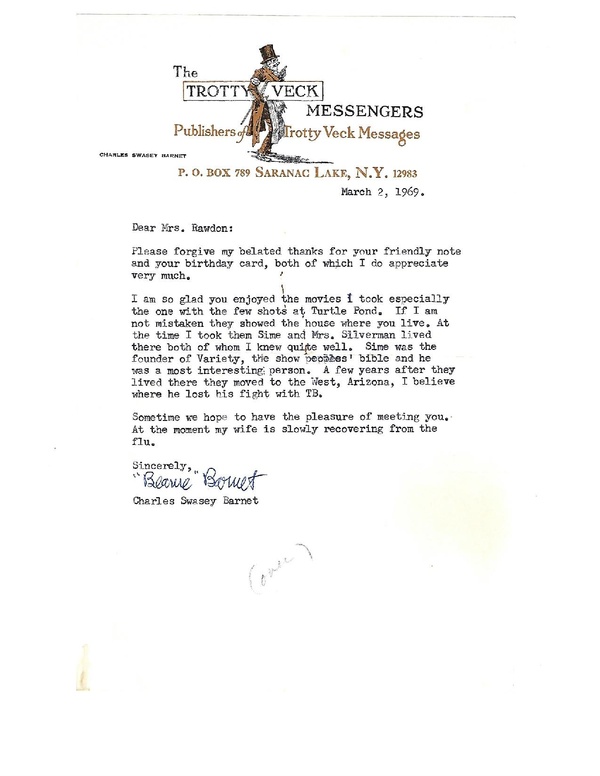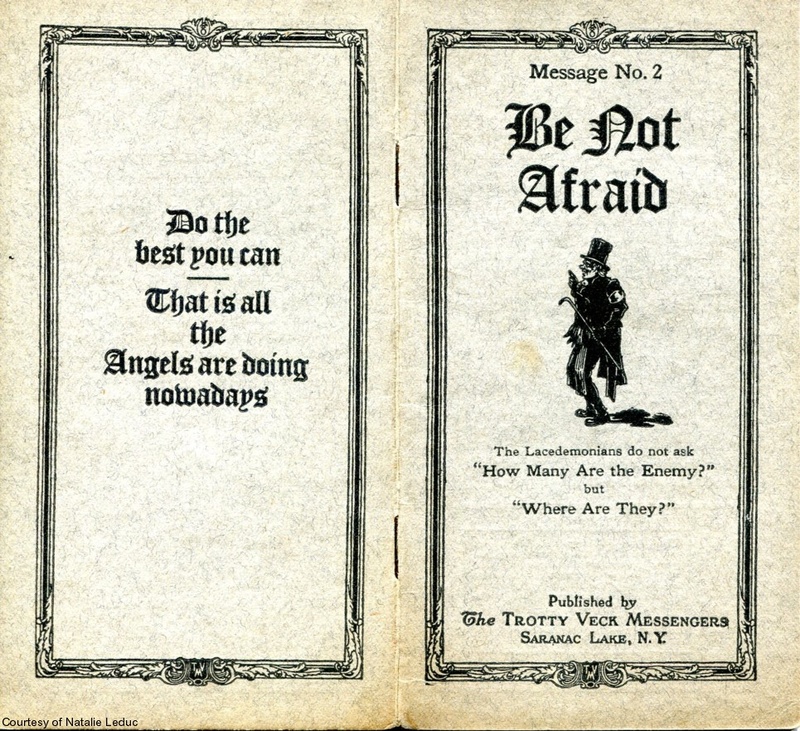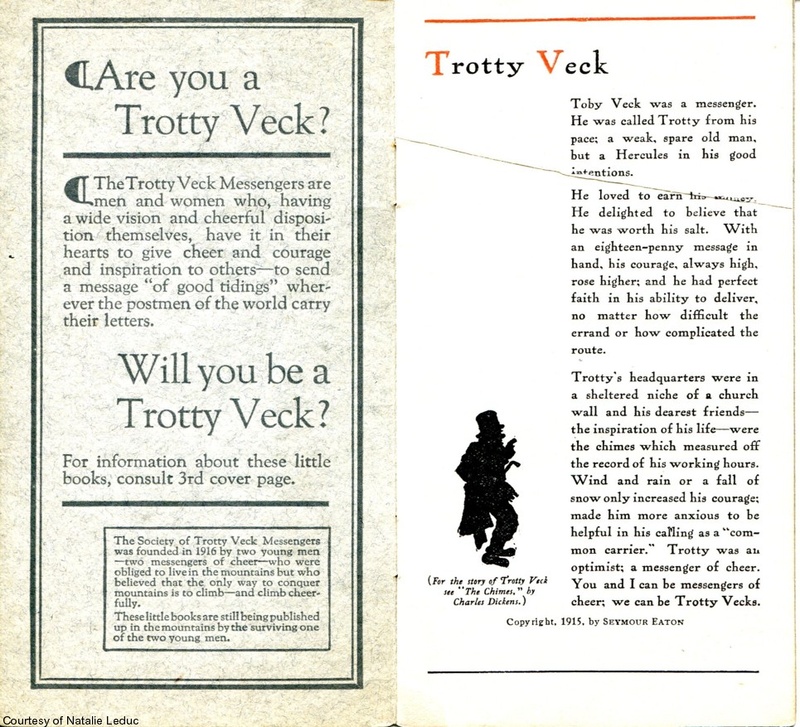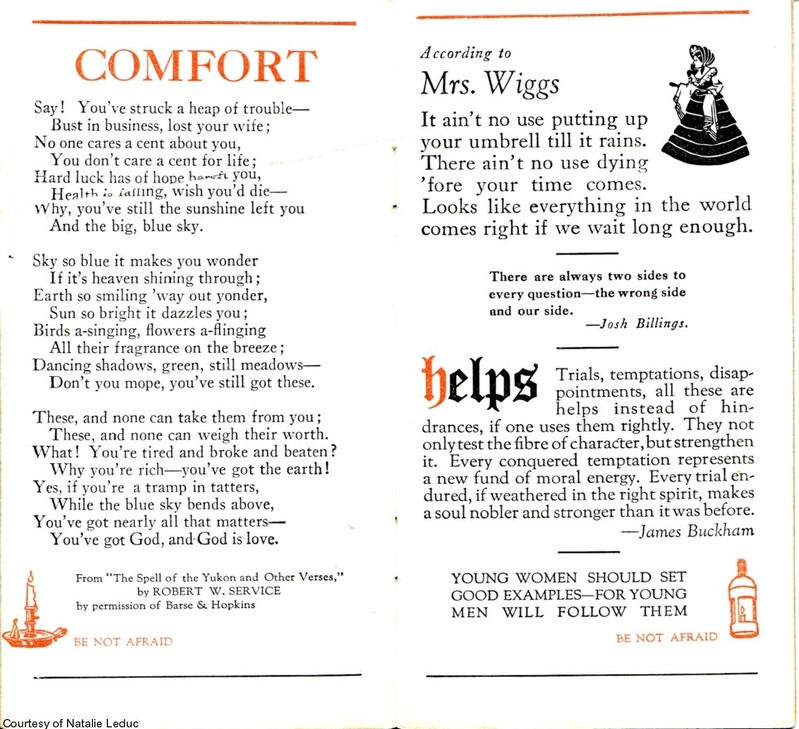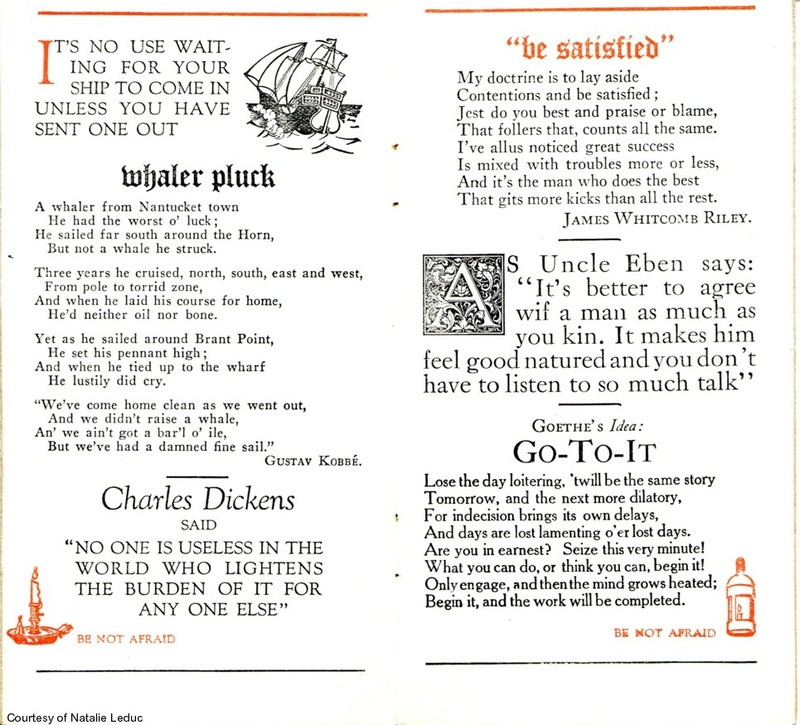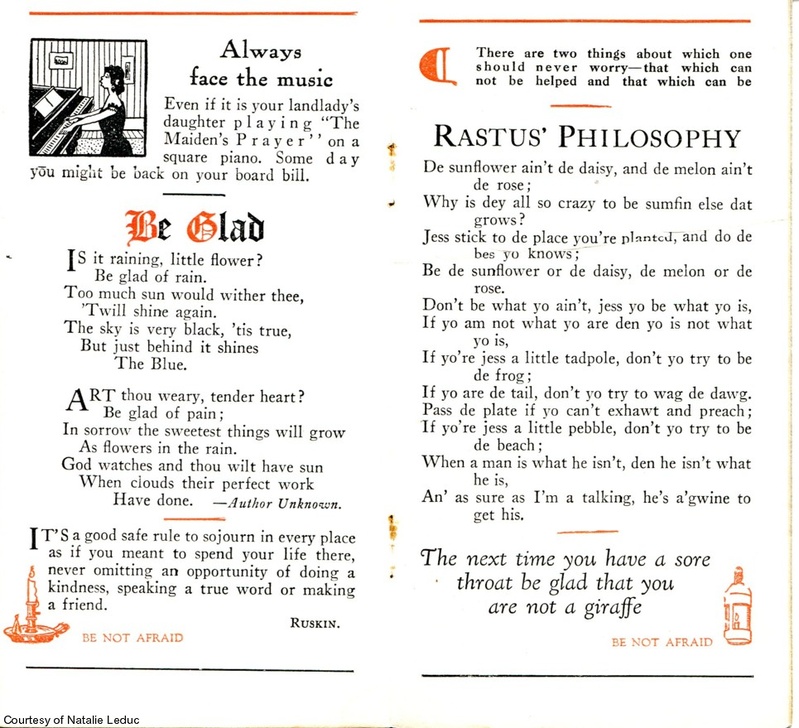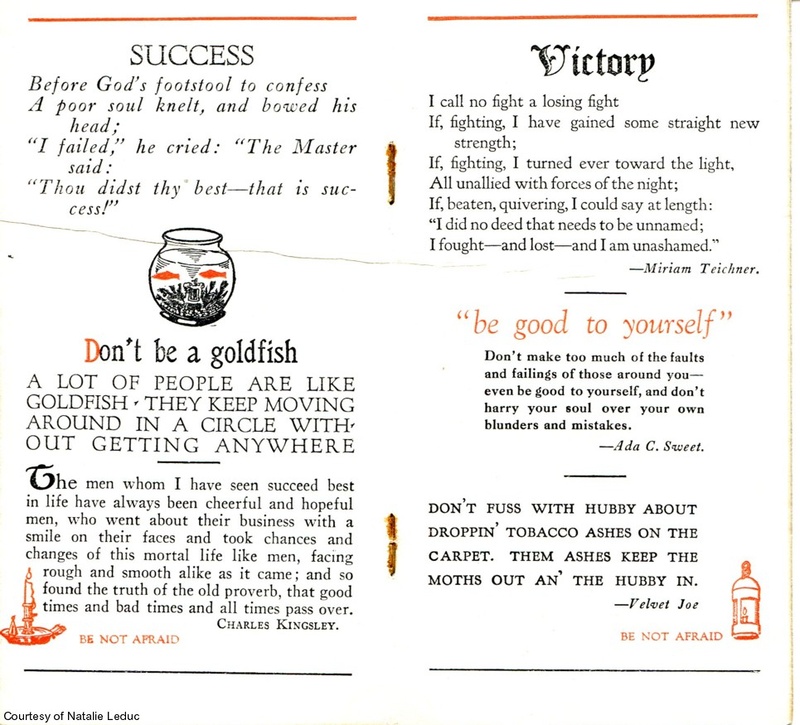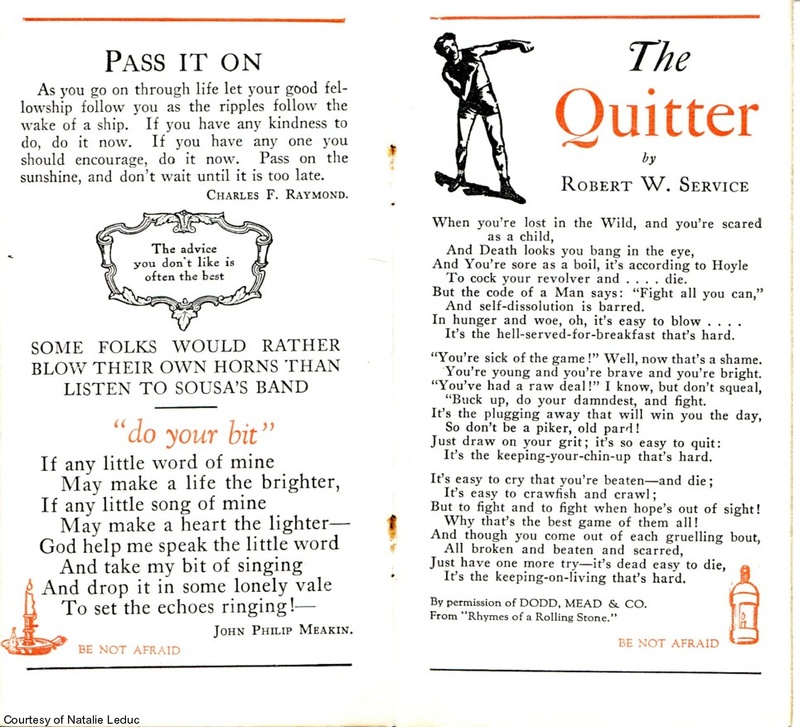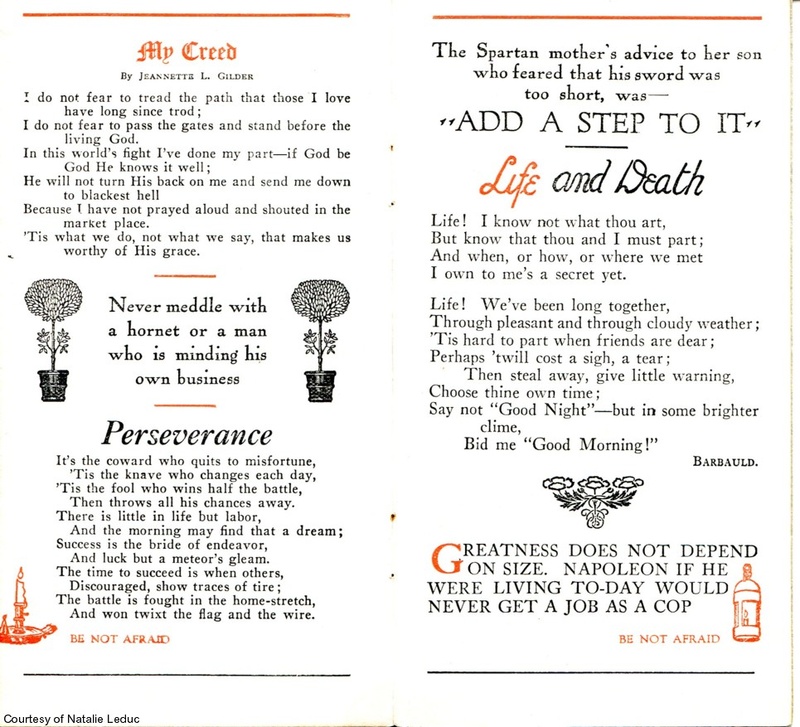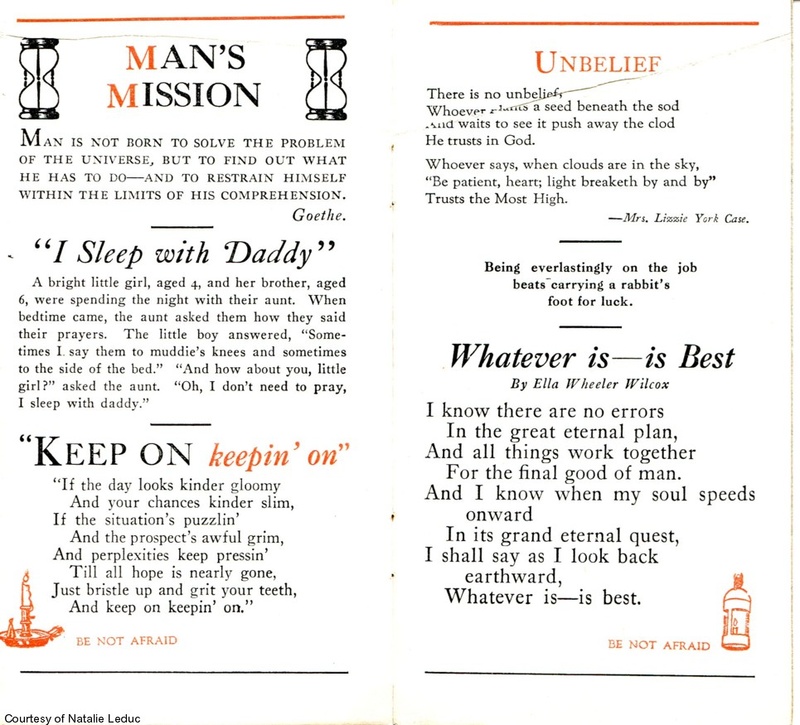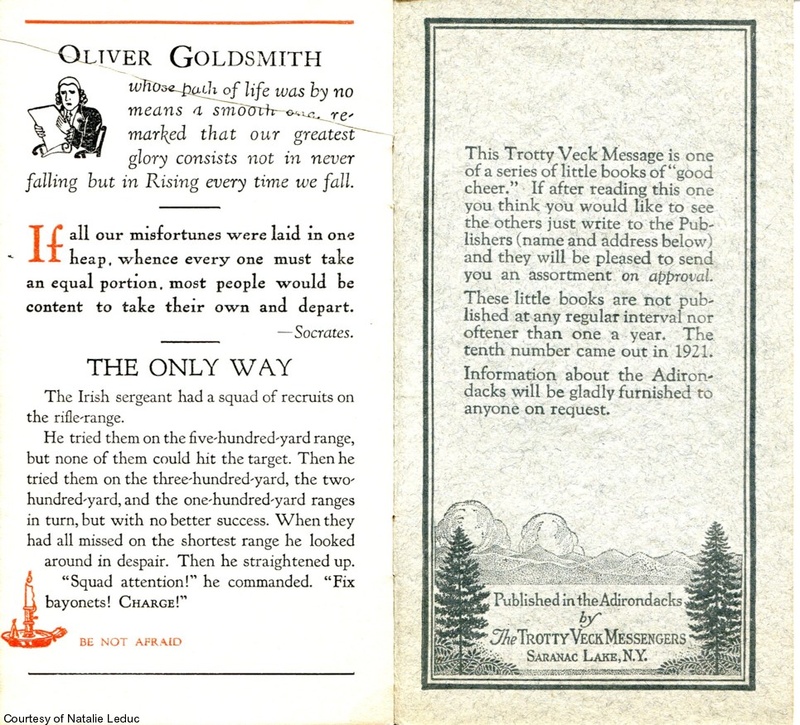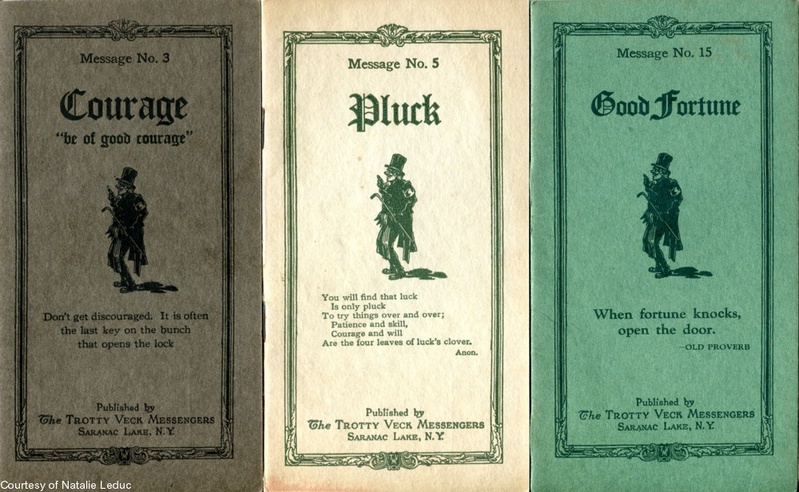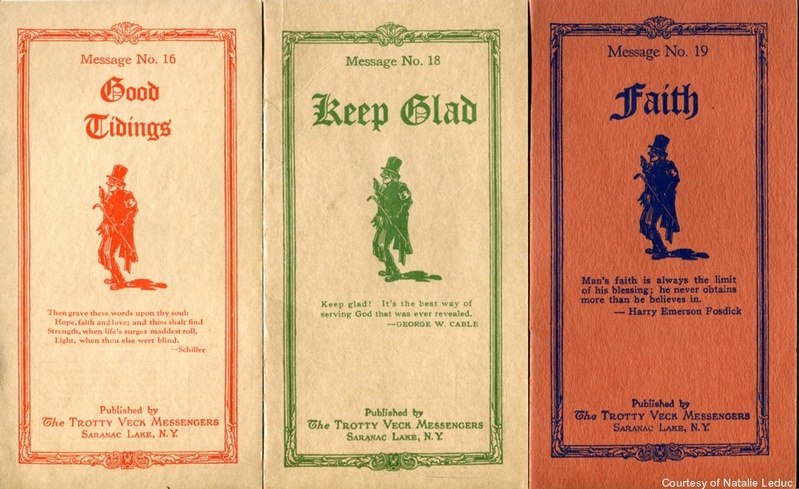The Trotty Veck Messages were pamphlets of advice and good cheer. The publication was begun in 1916 by two TB patients Seymour Eaton, Jr., and Charles Swasey Barnet. The Trotty Veck Messages would ultimately sell four million copies.
For some Saranac Lake patients, the chance to write and publish locally was literally a lifeline. One of the most innovative schemes for turning writing into dollars was hatched by patient Beanie Barnet and his Trudeau Sanatorium roommate Seymour Eaton, Jr. When Beanie and Seymour complained of feeling down, Seymour's father suggested they write inspirational messages to cheer each other up. Beanie and Seymour soon realized they could never pursue demanding careers, so the two decided to publish small chapbooks of these inspirational messages to cheer others and make money. Together they launched their Trotty Veck Messages series in 1916. A character in Charles Dickens' short story "The Chimes," Trotty Veck delivered messages of cheer to townsfolk, despite the frailties of his health. Barnet and Eaton fashioned themselves after Dickens' character and became "Trotty Vecks." Their Trotty Veck Messages contained short selections of prose and verse steeped in wisdom and humor. Quotations came from the widest imaginable range of sources from antiquity and current events to local lore. Shakespeare shares the spotlight with an old Adirondack guide in an issue devoted to the theme of "Friends." Shakespeare counsels, "Those friends thou has, and their adoption tried, / Grapple them to thy soul with hoops of steel, / But do not dull thy palm with entertainment / Of each new hatched unfledged comrade." Equally confident of his counsel, "The old Adirondack guide says he does not mind long sermons as they do not wake him up."
Trotty Veck became an instant success - an antidote for both TB and the Great War. Barnet and Eaton sold four thousand copies the first year of 1916. Sadly, Seymour Eaton died in 1918. But Beanie Barnet carried on. By 1966 the Adirondack Daily Enterprise reported that Trotty Veck Messages had sold 4 million copies worldwide. Beanie had arrived in Saranac Lake in 1907 expecting - like Edward Livingston Trudeau - to die. Instead, Beanie cured, wrote, stayed, employed others, and lived in Saranac Lake as both patient and ex-patient until he died there in 1977, aged ninety! Surely writing played a key role in Barnet's ability to cope with the challenges of TB. Certainly Barnet's widely distributed Trotty Veck Messages integrated the patient's voice into the discourse of this particularly widespread disease.
See: Beanie Barnet
"The House by the Side of the Road"
Author and date of publication unknown. Historic Saranac Lake Collection.
The publishing of the Trotty Veck Messages was started in 1916 by two young men; Seymour Eaton, Jr. and Charles Swasey Barnet. Both of them had come to Saranac Lake for their health. They were roommates in a private sanatorium when the idea of publishing good cheer messages was thought of. Seymour was born in Lansdowne, Pennsylvania and was a student at Syracuse University. He was the son of Seymour Eaton, Sr. who was famous as an advertising authority and as the originator of The Tabard Inn Library and The Book Lovers’ Library - unique circulating libraries that flourished in this country in the early 1900’s.
Charles Swasey Barnet (better known in Saranac Lake as “Beanie” Barnet because he came from Boston) was born in Dorchester, Massachustts - a suburb of Boston - and had to come to Saranac Lake just before he graduated from Boston Latin School. He was the son of Robert A. Barnet, a playwright, who wrote the book and lyrics of many successful musical shows as “1492,” “Jack and the Beanstalk,” “Miss Simplicity,” “The Show Girl,” and others which ran for years in the 1890s.
Seymour died in 1918. During the two previous years he had been bed ridden. After his death the publishing of the Messages was continued by Barnet alone. But in 1940 he acquired a new “partner.” He got married to Elisabeth Widmer, Swiss-born, a graduate of Johns Hopkins Hospital Training School for Nurses, who also came to Saranac Lake for her health. The rest of the family consists of a cocker spaniel, White Flash, a lovable and lively companion.
Their office and home is located two miles outside of the village, on the edge of the woods near a small lake. Here they have a garden and several feeding stations which attract flocks of wild birds the year around - a hobby they thoroughly enjoy. Bass fishing is the publisher’s avocation!
In 1916 only a few thousand Messages were sold but gradually the circulation increased each year, until it reached a close to one hundred thousand. During the years that the Messages have been published(- a new title usually each October) thousands of heart-warming letters have been received from people in all walks of life: and the large scrap books contain many from famous personalities such as Alice Hegan Rice, Carrie Jacobs Bond, “Roxy” of radio fame, Dr. Frank Crane, Sir Harry Lauder, Harry Houdini ( a check of his with his picture on it hangs on the office wall. It was never cashed), George Ade, Dr. Walter Damrosch and others numerous to mention.
Hundreds of letters came from boys in the service and from chaplains during both World Wars and the Korean War. The Messages apparently were great morale boosters.
Friends of Trotty Veck who are passing thru Saranac Lake are always given a warm welcome at “the house by the side of the road” at Lake Colby, Saranac Lake, New York - two Miles directly north from the Saranac Lake Post Office.
___
Note: The publications are Messages. The senders were Messengers.
Knickerbocker Press, Albany, NY, December 23, 1925
"Modern 'Trotty Veck' at Saranac Sends Messages of Cheer All Over the World
Toby Veck, the messenger who was created by Charles Dickens, who was called "Trotty" from his pace; a weak spare old man, but a Hercules in his good intentions, has a modern counterpart in this village. The name of the modern Trotty is Charles Swasey Barnet. Instead of standing in a sheltered niche of a church wall, as did the ancient Trotty, he dispatches his messages of cheer from offices in the main street of this village, which has a population largely made up of persons who suffer from physical ailments, even as both the ancient and modern Trotty. The name of the office is The Trotty Veck Messengers. From it, at least once each year, there go forth into the world real messages of cheer in the form of little booklets. The booklets are filled with cheerful and inspiring quotations. They are especially designed for invalids, sit-ins, and unfortunates.
This modern Trotty Veck, having more resources than the original, has been able to make his messages carry farther. Each year, according to his records, they reach 150,000 persons. They penetrate grim prison walls in all parts of the United States. They reach isolated farmhouses in all parts of the country. Steamships carry them to all parts of the world. Wherever sunshine is needed they are welcome. the ancient Trotty Veck, according to the story, "loved to earn his money. He delighted to believe that he was worth his salt. With an eighteen-penny message in his hand, his courage, always high, rose higher; and he had perfect faith in his ability to deliver, no matter how difficult the errand or how complicated the route." His successor is prompted by exactly the same motives. The Trotty Veck messages are, primarily, a business enterprise. From those who can afford it, the modern Trotty collects a fee for his messages. But when funds are lacking, the message is delivered with equal dispatch. In fact, it is the latter class which Trotty loves to serve.
Early in January, 1916, two young men, who had been ordered to the Adirondacks for their health, were confronted with the problem of earning their livelihood. Neither of them, physicians declared, would ever be able to engage in active work. Barnet was one of the young men. The other was Seymour Eaton Jr. It was Seymour Eaton Sr., father of the latter, that first conceived the idea. He, who is credited with being the originator of the teddy bear craze, and the founder of the Booklovers' Library, saw what was then a pioneer field. "There are thousands of people all over the world" he argued "who are in need of a message of cheer. We will give it to them. If they can pay for it, fine. If they can't, we will send it just the same." So the business was started in the boarding house bedroom shared by the young men. Trotty Veck who was discovered by the senior Eaton, lent himself admirably to the enterprise. The young men read constantly. Every helpful passage they discovered was marked. Then they wrote the publishers for permission to reprint it. Eaton's father agreed to take charge of the publication of the messages. In March of the same year, when the business was barely started, the senior Eaton died. The full burden of the venture fell upon the shoulders of the invalids. The first year, according to Barnet's records, they sold 4,000 messages. The next step was a move into an office in the business section of this village. Eaton was constantly failing in health. Barnet was able to devote only a few hours a day to the venture. A small office force was engaged.
In July, 1918, Eaton, who had been a student at Syracuse University at the time of his physical breakdown, lost the unequal fight. His death made Barnet directly responsible for the carrying on of what was then a vital need in the lives of thousands of persons. Barnet took up the burden. He was badly handicapped by his health. One hour at his typewriter left him weak. But he struggled on. Then, slowly but surely, the importance of Trotty Veck's work increased. And as Trotty grew in importance, so did Barnet gain in health. It was an uphill fight. The gains were slow-the ability to do two hours' work daily instead of one; strength sufficient to walk to the office instead of riding; and finally, the ability to pass an occasional hour in fishing in the lakes in which this section abounds. Barnet today, outwardly, is a well man. But physicians who can peer beneath the surface with the instruments, have pronounced their verdict. "Just like a patched up automobile tire; all right as long as the patches hold." Therefore, Trotty Veck will continue his rounds. Barnet today sat at the desk in the offices of The Trotty Veck Messengers. Trotty Veck was sending out his messages "wherever the postmen of the world carry their letters."
Upon the wall, protected by a glass frame, was one of those messages. It was tattered and torn. A ragged hole was visible in the corner. That message from Trotty was buttoned in the tunic of an American Marine when he dashed toward the German line. The bullet which clipped the corner also stilled the heart of the gallant Marine. When his comrades carried his body back they found the message with some of the paragraphs of cheer underlined. They sent it to his mother. She sent it to "Trotty." That message reached its destination.
One thousand messages entered the grim walls of Clinton prison in Dannemora. "In the past men asked for Bibles, but now their Bible seems to be your sunny booklet. I certainly do not resent this, because I know they can derive a great deal of good and happiness out of it." The signature beneath that letter is "Robert J. Booth, Chaplain." "I chanced to give one of the messages to a 'lifer,' After reading it once he came to me and asked if he might keep the booklet a while longer. I told him he could. When he returned it I asked him why he wanted it. 'I wish I were a millionaire' he answered 'I would flood the country with these messages. I am sure there would be less misery...'" The signature to that letter is "No. 13, 663." Trotty had safely delivered another message. There are similar letters from San Quentin prison in California, the Maryland penitentiary at Baltimore, and other institutions. They are all signed with a number. Some of the sentiments expressed in them would do credit to any name. Trotty's messages carried into the hospital room where Nellie Revell, with the love and sympathy of all Broadway, fought for her life, won. and emerged from the conflict with the applause of the world. "The first thing I can wish you," she wrote to Trotty "is that you can get half as much pleasure and help from my book as I obtained from the messages of Trotty."
There is a message to Trotty from a girl who twice each day soars through the air above the heads of the persons who attend the performance of the small traveling circus to which she belongs. "I read your messages everyday and like them" she wrote. "I lend them to everybody on the lot." Thus Trotty came to the "kinkers," the performers and the "roughnecks," the workers, who make up the world of the circus. He has gone backstage. Sir Harry Lauder is one of the theatrical stars who read his messages. Trotty has carried into the hospitals where disabled soldiers are paying the toll that is the aftermath of war. His words of cheer have been broadcast on the air from some of the largest radio stations in the country. Outwardly, Trotty Veck is just a prosaic man who sits before a desk opening envelopes. Some of them contain money; others do not, Trotty answers them all. That is why more than 150,000 have adopted him as their "messenger of good cheer."
Trotty Veck Messages , 1915-1965
1. Good Cheer, 1915
2. Be Not Afraid, 1916
3. Courage, 1917
4. Little Lights
5. Pluck
6. Patience & Be Patient
7. Reveille!, 1918
8. Be Strong, 1919
9. Be Friendly
10. Be Happy, 1920
11. Keep Smiling, 1921
12. All's Right, 1922
13. Good Luck, 1923
14. Good Wishes, 1924
15. Good Will, 1925
16. Good Fortune, 1926
17. Good Tidings, 1927
18. Happy Thoughts,1928
19. Keep Glad, 1929
20. Faith, 1930
21. Hope, 1931
22. Treasures, 1932
23. Real Riches, 1933
24. Compensation, 1934
25. Greatness, 1935
26. A Merry Heart, 1936
27. Wealth, 1937
28. Success, 1938
29. Ideals, 1939
30. Truth, 1940
31. Chuckles, 1941
32. Joy, 1941
33. Good Deeds, 1942
34. Light, 1943
35. Good Things, 1944
36. Good Words, 1945
37. Your Best, 1946
38. Opportunity, 1947
39. Happiness, 1948
40. Enthusiasm, 1949
41. Optimism, 1950
42. Happy Ideas, 1951
43. Happy Days, 1952
44. Blessings, 1953
45. Take Heart, 1954
46. Serenity, 1955
47. Happy Views, 1956
48. Good Humor, 1957
49. Friends, 1958
50. Happy Hearts, 1959
51. Merriment, 1960
52. Smiles, 1961
53. Gaiety, 1962
54. Happy Living, 1963
55. Cheery Ideas, 1964
56. Happy Hours, 1965
The following is a letter from Beany Barnett to Mrs. Rawdon, courtesy of Andrew Rawdon.


